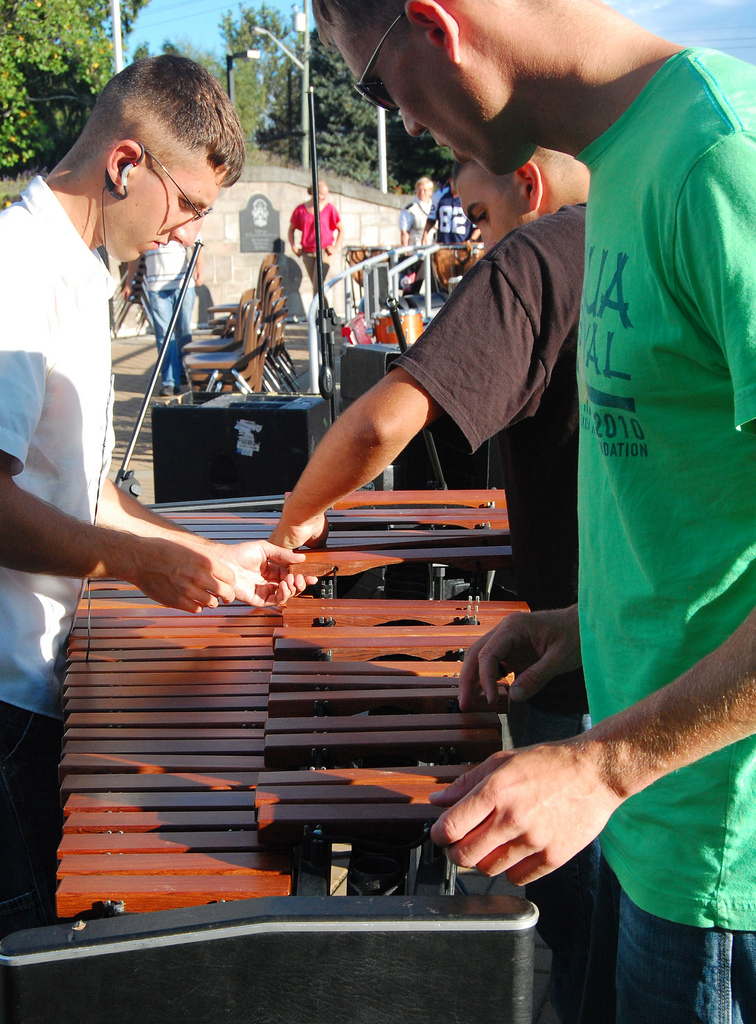
Originally published January 24, 2011 on Sound Education Blog.
Performing, listening to, and enjoying great music are their own rewards. But most people recognize that there are many additional life lessons learned while studying music. We discussed these lessons in a 2010 #MusEdChat collaborative session on Twitter. This series of blog posts contains my reflections on that discourse.
Life Lesson #5: Getting Along
Music is a cooperative undertaking. At the very least it involves a performer and a listener. But often we perform as an ensemble, as a band. These words themselves imply working together. Ensemble: an assemblage of parts or details considered as forming a whole. It’s interesting that ‘Band’ has two origins and two seemingly unrelated meanings that happen to both apply to music. From Old French ‘Bande’ meaning: A group of people. And from Germanic ‘Binden’ comes ‘Bind’ as well as ‘Bond’ and eventually ‘Band’:Something that holds together. As a group of people performing music, we are held together by the bond of the music itself and the music is bound by the participating musicians. It is no wonder that one of the life lessons we learn in music is to get along with others.
Why Do We Get Along?
Well, to begin with we are working toward a common goal. It is our nature to make strong bonds with those with whom we share our struggles and later successes. A band becomes a team. You can not successfully perform music without constantly observing and reacting to your band-mates. Even the lines and phrases within the composition are a conversation; a cooperative narrative being spun for the audience. Our communication is with the composer (living or dead; present or afar), the audience, and with each other. This is nowhere more clearly seen than in the improvisatory multilogue of jazz. We are no longer separated by popularity, athleticism, socio-economic status, or even national or cultural divisions when performing music in concert (another vocab word: mutual agreement). In all of our differences, we can understand each other through our music.
From MusEdChat:
@DoeMiSo: geek, jock, popular, not popular….performing together is the great equalizer.
@RizzRazz: how to get along: any ensembles, the diversity of world cultures, understanding people of different everything thru their music
@travisjweller: It is great to get to a point w/an ensemble where exchange of ideas happens freely and openly – trust and respect are in place.
The “Becoming” of a Band.
Many performing groups may call themselves a band but, in truth, there is a process of development that takes place leading to the truly cooperative, bonded ensemble. In baring and sharing ones emotions; in the process of collective interpretation, phrasing, blending, and articulation; in the live performance of the artwork that has been created – respect, trust, and understanding are cultivated. The ensemble matures musically and as friends. They become a band.
@travisjweller: performing in an ensemble builds a sense of community where there may not have been once before.
@michellek107: Respect, teamwork, community, focus, complement, ensemble- life skills learned while performing together.
@travisjweller: the ensemble as a performing & social organism may build trust, competence, courage, communication, and collective responsibility
What About You?
In the comments, let me know if you’ve been a part of a band, orchestra, chorus, or some other performance group. As you worked together, did you find your personal bonds growing to the point that you were better friends or even like a family? What is the best part of performing music for you?
This is part 5 of a 12 part series.


